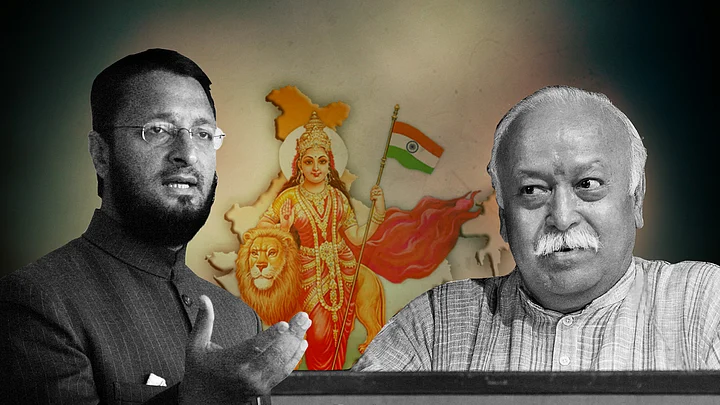Asaduddin Owaisi of the All-India Majlis-e-Ittehad-ul Muslimeen (AIMIM) has done everyone a favour by taking a stand on the catchphrase ‘Bharat Mata ki Jai’. His refusal to utter it helps clarify political positions. The saffron brotherhood has been forced publicly to restate its ideological position, despite Prime Minister Narendra Modi’s near-simultaneous rhetorical gestures towards a politics of inclusion.
The point is not what Owaisi’s politics are in a broader context, or the history of his party. It is a question of whether someone – anyone – has to, or can be made to, chant this celebratory mantra as a proof of nationalistic fervour. In that context, the suspension of AIMIM MLA Waris Pathan from the Maharashtra legislative assembly for refusing to chant the catchphrase when importuned to do so by a BJP member is significant.
Nationalistic Benediction
Owaisi maintains that his refusal to chant this catchphrase is contextual – the context being provided by the Rashtriya Swayamsewak Sangh (RSS) chief Mohan Bhagwat’s statement that Indians must be given lessons in chanting this catchphrase. Owaisi could have ignored it. But that he did not is hardly proof positive of treachery to the ‘motherland’.
The reactions to Owaisi’s statement (and Pathan’s ‘recalcitrance’) have exposed not just the depth of the right-wing Hindutva agenda – and its implicit hysteria – but ‘mainstream’ nationalist complicity with it. As Owaisi has pointed out, Congress MLAs joined their BJP counterparts in pressing for Pathan’s suspension and later the Madhya Pradesh assembly passed a censure motion against Owaisi, which was tabled by a Congress MLA.
Some people, including Javed Akhtar, inveighed against Owaisi’s stand and in support of the iteration of the catchphrase, presumably because it is an inescapable nationalistic benediction. But this position is hardly reasonable. Quite apart from the fact that no one is required by any law, code or convention to chant this catchphrase, or the associated ‘Vande Mataram’, it has a history that has to be reckoned with.
Both these phrases were coined by Bankim Chandra Chattopadhyay, who by any reckoning must count as one of the forebears of a nationalist ideology heavily inflected by Hindu symbolism and is, at the very least covertly, anti-Muslim. Both the symbolism and the anti-Muslim prejudice came to constitute a significant strand in the Congress-led nationalist movement in the twentieth century.
Thereafter, as ‘Bharat Mata ki Jai’ was appropriated by the Hindu right, the RSS and the Hindu Mahasabha, as a rallying cry for majoritarian mobilisation and consolidation, it became less important in the Congress party’s lexicon. With the advent of the Nehruvian ascendancy in the party and, after independence, a formal commitment to secularism, this trend was confirmed.
‘Bharat Mata ki Jai’
There can be no doubt that during the course of the last century the ‘Bharat Mata ki Jai’ rallying cry has been transformed into a powerful symbol of the sangh parivar’s right-wing, Hindu version of nationalism and its imagination of a nation that is so permeated by the ‘culture’ of the majority community that the latter, in fact, becomes constitutive of the nation. The catchphrase is also representative of the imagination of the nation as the divine mother, which, too, is obviously a Hindu construction.
A Muslim politician’s refusal to iterate such a catchphrase is unsurprising. It can hardly be argued, however, that this refusal is a token of minority ‘communalism’, let alone anti-nationalism. A large number of Indian citizens who do not subscribe to the BJP and sangh parivar’s Hindu nationalism and their imagining of the nation as some kind of divine mother will also balk at naming their country Bharat Mata in order to then celebrate it.
Liberal, ‘deracinated’ citizens who sign up to a constitutionally mandated idea of a nation or nation-state can, not unreasonably, concur with the argument that rallying cries such as ‘Bharat Mata ki Jai’ or ‘Vande Mataram’ represent a particular nationalistic drive that seeks to isolate minorities and render them, their cultural practices and their identities as illegitimate impediments to the fashioning and refashioning of first, the nation, and eventually the state.
RSS and BJP’s Agenda is Pellucid
That such an apprehension is not liberal or left paranoia is obvious from the draconian proscriptions against not just eating beef, but even being in possession of it, that have been imposed over large swathes of the country. Quite apart from the fact that such proscription is an unjust imposition on the dietary choices of Muslims, Christians, Dalits and others, it has fuelled a ‘cow-protection’ movement that has led to widespread intimidation of Muslims and at least two incidents of lynching – a Muslim man was murdered last year in Uttar Pradesh on the basis of the mistaken idea that he had eaten beef, and very recently two Muslim men who were driving a herd of buffaloes to a market were killed in Jharkhand.
The RSS and the BJP’s agenda is pellucid: this agenda is majoritarian consolidation, which is at the heart of their ideological and political programme. For the latter, it is a convenient electoral strategy as well. What is inexplicable in the twenty-first century is why the Congress party is investing so heavily in Bharat Mata. But whatever the reason, it hardly bodes well for all those who would like to embrace diversity, choice and individual liberty.
(The writer is a Kolkata-based freelance journalist and researcher.)
(At The Quint, we question everything. Play an active role in shaping our journalism by becoming a member today.)
